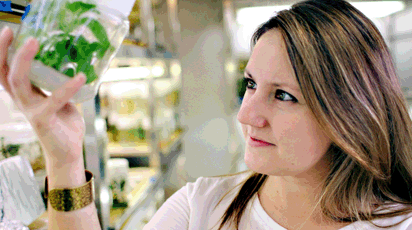La científica del Centro Nacional de Biotecnología del CSIC (CNB) Selena Giménez-Ibáñez ha sido becada en la 16º edición internacional del Programa L'Oréal-UNESCO For Women in Science. Giménez-Ibáñez se convierte de este modo en la tercera española becada en los 16 años de este programa.
 Selena Gimánez-Ibáñez estudió Ingeniería Agrónoma en la Universidad Politécnica de Valencia y obtuvo su doctorado en The Sainsbury Laboratory (Norwich, Reino Unido), uno de los principales centros europeos en investigación de enfermedades en plantas, donde se especializó en fitopatología vegetal y mecanismos de resistencia de plantas a enfermedades.
Selena Gimánez-Ibáñez estudió Ingeniería Agrónoma en la Universidad Politécnica de Valencia y obtuvo su doctorado en The Sainsbury Laboratory (Norwich, Reino Unido), uno de los principales centros europeos en investigación de enfermedades en plantas, donde se especializó en fitopatología vegetal y mecanismos de resistencia de plantas a enfermedades.
Desde hace tres años trabaja en el CNB con el profesor Roberto Solano, intentando descubrir nuevos componentes de defensa en las plantas y cómo transferirlos a especies agronómicas con importancia económica. "Hacemos grandes esfuerzos por movilizar los descubrimientos del laboratorio al campo, y de ahí a la sociedad", afirma Selena.
Su trabajo se centra en averiguar los mecanismos de defensa de las plantas contra los microbios que las rodean, así como descubrir los mecanismos que utilizar ciertas bacterias patógenas para infectar a las plantas.
Sus logros más relevantes en los últimos años se han basado en la caracterización del sistema inmune de las plantas -el llamado sistema inmune basal-. Las plantas tienen unos 600 receptores que lo ven todo, son como ojos encargados de ver lo que pasa fuera y responder adecuadamente a cada estímulo. Precisamente, el segundo hito de su investigación es haber identificado moléculas microbianas que destruyen estos receptores para cegar a las plantas y poder hacer con ellas lo que quieran, es decir, causar una enfermedad. Muy recientemente, Selena ha demostrado que esas moléculas microbianas son capaces también de manipular las hormonas de las plantas y dejarlas desorientadas, lo que es completamente necesario para lograr la infección.
Convencida de que en la ciencia se esconden las respuestas de la mayoría de los problemas económicos actuales, el objetivo final de Selena Giménez-Ibáñez es solucionar el gran problema de las pérdidas de producción que se producen cada año por culpa de la plagas de enfermedades. "La FAO estima que aproximadamente el 10% de la producción mundial se pierde por enfermedades. Así que cualquiera puede imaginar el problema tan grave al que nos enfrentamos en un mundo con población creciente y grandes focos de hambre en el tercer mundo", explica la joven científica.
Respecto a la beca L’Oréal-UNESCO For Women in Science que recibirá en París el próximo 19 de marzo, destaca que le permitirá abrir su actual proyecto en curso, en áreas nuevas, manteniendo mis principales intereses científicos. "El objetivo es ir a un grupo líder de investigación como el de Dr. Vardis Ntoukakis en Inglaterra. Allí están haciendo cosas muy novedosas que permitirán solucionar problemas agronómicos que padecemos ahora".





